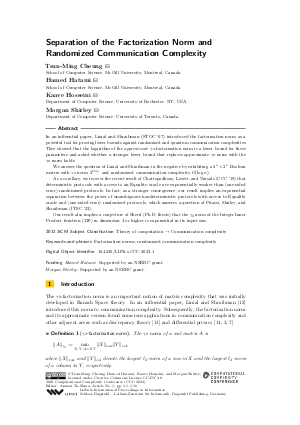Separation of the Factorization Norm and Randomized Communication Complexity
Authors Tsun-Ming Cheung, Hamed Hatami, Kaave Hosseini, Morgan Shirley
-
Part of:
Volume:
38th Computational Complexity Conference (CCC 2023)
Part of: Series: Leibniz International Proceedings in Informatics (LIPIcs)
Part of: Conference: Computational Complexity Conference (CCC) - License:
 Creative Commons Attribution 4.0 International license
Creative Commons Attribution 4.0 International license
- Publication Date: 2023-07-10
File

PDF
LIPIcs.CCC.2023.1.pdf
- Filesize: 0.77 MB
- 16 pages
Document Identifiers
Subject Classification
ACM Subject Classification
- Theory of computation → Communication complexity
Keywords
- Factorization norms
- randomized communication complexity
Metrics
- Access Statistics
-
Total Accesses (updated on a weekly basis)
0PDF Downloads0Metadata Views
Abstract
In an influential paper, Linial and Shraibman (STOC '07) introduced the factorization norm as a powerful tool for proving lower bounds against randomized and quantum communication complexities. They showed that the logarithm of the approximate γ₂-factorization norm is a lower bound for these parameters and asked whether a stronger lower bound that replaces approximate γ₂ norm with the γ₂ norm holds. We answer the question of Linial and Shraibman in the negative by exhibiting a 2ⁿ×2ⁿ Boolean matrix with γ₂ norm 2^Ω(n) and randomized communication complexity O(log n). As a corollary, we recover the recent result of Chattopadhyay, Lovett, and Vinyals (CCC '19) that deterministic protocols with access to an Equality oracle are exponentially weaker than (one-sided error) randomized protocols. In fact, as a stronger consequence, our result implies an exponential separation between the power of unambiguous nondeterministic protocols with access to Equality oracle and (one-sided error) randomized protocols, which answers a question of Pitassi, Shirley, and Shraibman (ITSC '23). Our result also implies a conjecture of Sherif (Ph.D. thesis) that the γ₂ norm of the Integer Inner Product function (IIP) in dimension 3 or higher is exponential in its input size.
Cite As Get BibTex
Tsun-Ming Cheung, Hamed Hatami, Kaave Hosseini, and Morgan Shirley. Separation of the Factorization Norm and Randomized Communication Complexity. In 38th Computational Complexity Conference (CCC 2023). Leibniz International Proceedings in Informatics (LIPIcs), Volume 264, pp. 1:1-1:16, Schloss Dagstuhl – Leibniz-Zentrum für Informatik (2023)
https://doi.org/10.4230/LIPIcs.CCC.2023.1
BibTex
@InProceedings{cheung_et_al:LIPIcs.CCC.2023.1,
author = {Cheung, Tsun-Ming and Hatami, Hamed and Hosseini, Kaave and Shirley, Morgan},
title = {{Separation of the Factorization Norm and Randomized Communication Complexity}},
booktitle = {38th Computational Complexity Conference (CCC 2023)},
pages = {1:1--1:16},
series = {Leibniz International Proceedings in Informatics (LIPIcs)},
ISBN = {978-3-95977-282-2},
ISSN = {1868-8969},
year = {2023},
volume = {264},
editor = {Ta-Shma, Amnon},
publisher = {Schloss Dagstuhl -- Leibniz-Zentrum f{\"u}r Informatik},
address = {Dagstuhl, Germany},
URL = {https://drops.dagstuhl.de/entities/document/10.4230/LIPIcs.CCC.2023.1},
URN = {urn:nbn:de:0030-drops-182714},
doi = {10.4230/LIPIcs.CCC.2023.1},
annote = {Keywords: Factorization norms, randomized communication complexity}
}
Author Details
Funding
- Hatami, Hamed: Supported by an NSERC grant.
- Shirley, Morgan: Supported by an NSERC grant.
References
-
Shalev Ben-David, Adam Bouland, Ankit Garg, and Robin Kothari. Classical lower bounds from quantum upper bounds. 2018 IEEE 59th Annual Symposium on Foundations of Computer Science (FOCS), pages 339-349, 2018.

-
Arkadev Chattopadhyay, Shachar Lovett, and Marc Vinyals. Equality alone does not simulate randomness. In 34th Computational Complexity Conference (CCC 2019), 2019.

-
Alexander Edmonds, Aleksandar Nikolov, and Jonathan Ullman. The power of factorization mechanisms in local and central differential privacy. In Proceedings of the 52nd Annual ACM SIGACT Symposium on Theory of Computing, pages 425-438, New York, NY, USA, June 2020. Association for Computing Machinery.

-
Ben Green and Tom Sanders. Boolean functions with small spectral norm. Geometric and Functional Analysis, 18(1):144-162, 2008.

- Lianna Hambardzumyan, Hamed Hatami, and Pooya Hatami. Dimension-free bounds and structural results in communication complexity. Israel J. Math., 2022. URL: https://doi.org/10.1007/s11856-022-2365-8.
-
Hamed Hatami, Pooya Hatami, William Pires, Ran Tao, and Rosie Zhao. Lower bound methods for sign-rank and their limitations. In Approximation, Randomization, and Combinatorial Optimization. Algorithms a, volume 245, pages 22:1-22:24, 2022.

- Monika Henzinger and Jalaj Upadhyay. Constant matters: Fine-grained complexity of differentially private continual observation using completely bounded norms. arXiv preprint, 2022. URL: https://arxiv.org/abs/2202.11205.
-
Wei Huang, Yaoyun Shi, Shengyu Zhang, and Yufan Zhu. The communication complexity of the Hamming distance problem. Inform. Process. Lett., 99(4):149-153, 2006.

-
Hartmut Klauck. Lower bounds for quantum communication complexity. In Proceedings 42nd IEEE Symposium on Foundations of Computer Science, pages 288-297. IEEE, 2001.

-
Eyal Kushilevitz and Noam Nisan. Communication complexity. Cambridge University Press, Cambridge, 1997.

- Troy Lee, Adi Shraibman, and Robert Špalek. A direct product theorem for discrepancy. In 2008 23rd Annual IEEE Conference on Computational Complexity, pages 71-80, 2008. URL: https://doi.org/10.1109/CCC.2008.25.
-
Nati Linial and Adi Shraibman. Lower bounds in communication complexity based on factorization norms. Random Structures & Algorithms, 34(3):368-394, 2009.

- Jiri Matousek, Aleksandar Nikolov, and Kunal Talwar. Factorization norms and hereditary discrepancy. arXiv preprint, 2014. URL: https://arxiv.org/abs/1408.1376.
-
Shanmugavelayutham Muthukrishnan and Aleksandar Nikolov. Optimal private halfspace counting via discrepancy. In Proceedings of the forty-fourth annual ACM symposium on Theory of computing, pages 1285-1292, 2012.

-
Ramamohan Paturi and Janos Simon. Probabilistic communication complexity. Journal of Computer and System Sciences, 33(1):106-123, 1986.

- Toniann Pitassi, Morgan Shirley, and Adi Shraibman. The strength of equality oracles in communication. In Yael Tauman Kalai, editor, 14th Innovations in Theoretical Computer Science Conference (ITCS 2023), volume 251 of Leibniz International Proceedings in Informatics (LIPIcs), pages 89:1-89:19, Dagstuhl, Germany, 2023. Schloss Dagstuhl endash Leibniz-Zentrum für Informatik. URL: https://doi.org/10.4230/LIPIcs.ITCS.2023.89.
-
Alexander A Razborov. Quantum communication complexity of symmetric predicates. Izvestiya: Mathematics, 67(1):145, 2003.

-
Suhail Sherif. Communication Complexity and Quantum Optimization Lower Bounds via Query Complexity. PhD thesis, Tata Institute of Fundamental Research, Mumbai, 2021.

-
József Solymosi. Incidences and the spectra of graphs. In Combinatorial number theory and additive group theory, pages 299-314. Springer, 2009.

